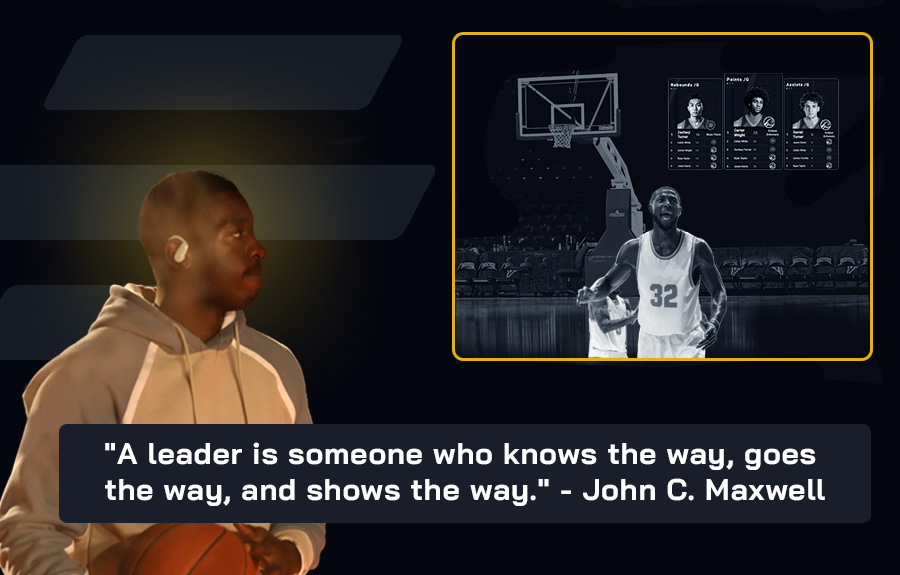“If your actions inspire others to dream more, learn more, do more and become more, you are a leader.” – John Adams
Owning a sports league presents a unique leadership opportunity. You’re responsible for fostering a competitive environment, promoting player engagement, and ultimately, ensuring the league’s success. But effective league management goes beyond simply making decisions.
Leaders wear many hats, but some of their core functions include:
- Vision and Direction: They set a clear vision for the future, outlining goals and a roadmap to achieve them.
- Motivation and Inspiration: They inspire and motivate those around them to work towards a common goal. This can involve encouragement, recognition, and building a positive team spirit.
- Communication: They effectively communicate the vision and goals to everyone involved. This includes clear instructions, active listening, and fostering open communication.
- Decision-Making: They make tough choices, often under pressure, considering all the options and potential consequences.
- Empowerment: Effective leaders empower others, trusting their team members and giving them the resources and autonomy to succeed.
- Problem-Solving: They are adept at solving problems, coming up with creative solutions, and adapting to changing situations.
Great leaders also typically possess qualities like integrity, honesty, and strong work ethic. They are often good listeners and value the input of others.
As an owner, you’re the driving force behind a thriving community of players. Here are some key strategies to elevate your leadership and navigate this exciting role:
1. Collaborative Decision-Making
While the final call rests with you, fostering a collaborative spirit is crucial. Establish communication channels where players can voice concerns, propose ideas, and participate in rule discussions. This fosters a sense of ownership and buy-in, leading to a more engaged player base.
2. Data-Driven Innovation
League management thrives on informed decisions. Utilize relevant metrics to track player performance, game statistics, and overall league trends. Analyze this data to identify areas for improvement, assess the effectiveness of existing rules, and explore innovative approaches to enhance the league experience.
3. Foster Camaraderie Beyond Competition
Remember, a league is more than just winning games. Organize social events or volunteer initiatives that build camaraderie and encourage interaction outside of competition. This fosters a sense of community and strengthens the overall league experience for everyone.
4. Conflict Resolution and Diplomacy
Inevitably, disputes will arise. As the league owner, assume the role of a fair and impartial mediator. Develop a conflict resolution process that prioritizes clear communication and encourages players to reach mutually agreeable solutions.
5. Continuous Improvement
Effective leadership requires a commitment to ongoing learning. Stay abreast of industry trends, explore best practices implemented by other leagues, and actively solicit feedback from players. By continuously seeking ways to improve, you ensure your league remains at the forefront of the game.
6. Communication is King (and Queen)
Clear and consistent communication is the cornerstone of effective league leadership. Utilize multiple channels to reach players: emails, league websites, or even a dedicated messaging group. Regularly share updates, address concerns promptly, and ensure everyone feels informed and heard.
7. Staying Organized The Power of Planning
Leagues thrive on structure. Utilize online tools and calendar apps to manage games, track standings, and set deadlines. By staying organized, you free up mental space to focus on the bigger picture.
8. Use Tech Tools
Embrace technology to streamline league management. Explore online platforms like the Sports Track Dashboard, communication apps specifically designed for sports leagues, and even digital scorekeeping tools. These tools can revolutionize your workflow and free up valuable time for more strategic initiatives.
9. Boundaries Respecting Your Time (and Theirs)
Setting healthy boundaries is crucial. Establish clear communication windows for league matters and stick to them. This allows players to address concerns efficiently while respecting your personal time. Utilize automated tools for rule reminders or schedule updates to minimize unnecessary back-and-forth.
“The challenge of leadership is to be strong, but not rude; be kind, but not weak; be bold, but not bully; be thoughtful, but not indecisive; be respectful, but not fearful; and be humble, but not timid.” – Jim Rohn
Leading a sports league is more than just about wins and losses. It’s about inspiring a community of players to compete, connect, and excel. By incorporating these strategies, you can cultivate a thriving league that fosters a passion for the sport and a sense of belonging for all.


